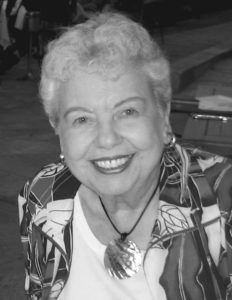This article originally appeared in The Bar Examiner print edition, March 2016 (Vol. 85, No. 1), pp 72.
By Jerome C. Hafter
 Beverly Tarpley, former chair of the NCBE Board of Trustees (1992–1993) and chair of NCBE’s Editorial Advisory Committee since 2010, passed away on February 14, 2016. The following is a tribute to Beverly written by Jerome C. Hafter, who chaired the NCBE Board of Trustees from 1998 to 1999.
Beverly Tarpley, former chair of the NCBE Board of Trustees (1992–1993) and chair of NCBE’s Editorial Advisory Committee since 2010, passed away on February 14, 2016. The following is a tribute to Beverly written by Jerome C. Hafter, who chaired the NCBE Board of Trustees from 1998 to 1999.
The National Conference of Bar Examiners, at its headquarters in Madison, Wisconsin, has a gallery of portraits of NCBE chairs dating to the founding of NCBE in 1931. An observer is immediately struck by the fact that from 1931 until 1989, all of the 48 chairs were men. In stark contrast, from 1989 to 2016, 10 of the 27 chairs have been women. Beverly Tarpley, appointed to the NCBE Board in 1985 and the second woman to serve as NCBE chair, from 1992 to 1993, was at the pivot point in breaking the glass ceiling in the American legal profession.
Beverly was a prodigy in the law. Born in 1930 in Houston, Texas, Beverly enrolled as an undergraduate at the University of Texas at the age of 15. She earned her bachelor’s degree at 19 and became one of four women to enter the University’s law school in 1949. Beverly was the only woman in her entering class at UT to finish, earning her J.D. in 1951. She was required, however, to wait until her 21st birthday to sit for the Texas Bar Exam.
Entering the legal profession remained a hurdle; in the early 1950s, Texas law firms were only beginning to open their doors to women attorneys. However, Beverly received an invitation to join the Abilene firm of Scarborough, Yates, Scarborough and Black in 1951, becoming the first woman attorney in Abilene, Texas, where she practiced for over 50 years, retiring from active practice in 2004. During those 50-plus years, Beverly was the paradigm for change in the legal profession in Texas and nationwide.
In 1953, Beverly married Dick Tarpley, then a young newspaper reporter at the Abilene Reporter-News. Dick would become editor of the newspaper in 1979. In the great tradition of newspaper editors in midsize American cities, Dick Tarpley and his life partner, Beverly, greatly contributed to life in their adopted city of Abilene, where they reared their two children, Charles Tarpley and Beth Tarpley Rathe.
In 1957, at the age of 27, Beverly became the first woman lawyer from Texas and the youngest lawyer ever to argue a case before the U.S. Supreme Court. Her client, a woman who worked for a railroad, had resisted the advances of a superior. In retaliation, she was told, “There’s a 50-pound sack of mail—go lift it by yourself.” As a result, the woman injured her back. Beverly sued the railroad under the Federal Employers’ Liability Act (FELA) in U.S. District Court. Beverly later commented that at that time, they didn’t know to call it sexual harassment. Beverly won the case in U.S. District Court, but the U.S. Court of Appeals for the Fifth Circuit reversed and held for the railroad. Angered by the unfair result, Beverly sought a writ of certiorari from the U.S. Supreme Court, which, to Beverly’s surprise, granted oral argument. The Supreme Court by a six-to-three majority reversed the Fifth Circuit’s decision and returned the case for retrial under new standards for FELA cases set by the Supreme Court.
In another of her notable cases, Beverly earned a reputation in the area of freedom of expression, defending in 1961 the Oscar-nominated film Never on Sunday against a ban by a censorship board for movies that Abilene had in place at the time—a case that earned Beverly and the board national attention and a spot on the CBS Evening News.
Beverly’s public service to the legal profession began in 1956 when she was the first woman appointed to the Texas Supreme Court’s Advisory Committee on the Rules of Civil Procedure, where she served for two decades, during which the rules of practice in Texas courts were revolutionized. In 1975, Beverly was named as the first woman member of the Texas Board of Law Examiners, where she served for 16 years under four Chief Justices, including 6 years as chair.
In 1985, Beverly was elected to the NCBE Board of Trustees and served as NCBE chair from 1992 to 1993. Following her term on the Board, Beverly continued her service to NCBE through outstanding committee work, including 21 years of service on NCBE’s Editorial Advisory Committee, which evaluates content for the Bar Examiner. She served as chair of the Committee most recently from 2010 until her death.
In 1990, Beverly was elected to the Council of the Section of Legal Education and Admissions to the Bar of the American Bar Association; and in 1997, she was elected chair of the ABA Council, becoming one of a handful of lawyers to have served both as NCBE chair and chair of the Council of the ABA Section, the two highest board positions in law school accreditation and admission to the bar.
Beverly became interested in the international aspects of law practice. She conducted site visits for the ABA, often accompanied by Dick, to numerous foreign summer programs hosted by American law schools. In the early 1990s, she was appointed by the ABA as one of the U.S. members of the three-nation (U.S., Canada, and Mexico) NAFTA committee charged with the responsibility for facilitating cross-border delivery of legal services under the NAFTA Treaty.
Beverly Tarpley was a legal prodigy, a trailblazer, a respected attorney, a powerful administrator, and a wise counselor on bar admissions and legal education policy. Beverly’s keen mind and insights into people and institutions were her strongest professional traits. For those who were fortunate enough to have known and worked with Beverly, we remember her humor, sincerity, and genuine attraction to other people. As her nephew, the Honorable Leslie Southwick, a judge on the U.S. Court of Appeals for the Fifth Circuit, wrote after his aunt’s recent death: “What strikes me about the always-smiling Aunt Beverly was her remarkable capacity for friendship. She did not just become acquainted with people; she quickly made them her friends.”
Beverly Tarpley lighted her corner of the world, and all of us are better for having known her.
Contact us to request a pdf file of the original article as it appeared in the print edition.







